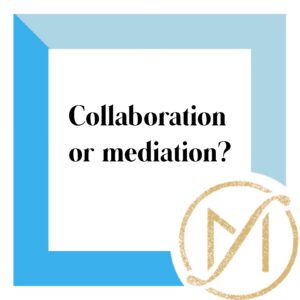 Divorce is a major life change for you and your children, but doesn’t have to be conflict-laden or emotionally devastating. A divorce need not involve a nasty and drawn-out courtroom battle. Instead, it is possible to end a marriage in gentler ways that protect the children and preserve the dignity of your relationship with your former spouse. The main alternatives to traditional litigated divorce are mediation and collaboration.
Divorce is a major life change for you and your children, but doesn’t have to be conflict-laden or emotionally devastating. A divorce need not involve a nasty and drawn-out courtroom battle. Instead, it is possible to end a marriage in gentler ways that protect the children and preserve the dignity of your relationship with your former spouse. The main alternatives to traditional litigated divorce are mediation and collaboration.
Mediation
Divorce mediation is a process in which a couple works with a neutral, third-party mediator. Mediation’s goal is for you to agree on all critical aspects of the divorce, such as alimony and spousal support, custody of minor children, and division of marital assets and debts. Unlike judges, mediators do not impose an outcome on either of you. Their role is to help you reach resolutions appropriate to your unique needs and circumstances.
Although mediation is not a courtroom process, you and your spouse will each retain your independent legal counsel. We call these independent attorneys “review counsel,” and they consult with you individually before you sign the final settlement agreement.
Read: What Is Mediation in Divorce?
Collaborative Divorce
Collaborative divorce is another process that allows you and your spouse to reach a divorce settlement without appearing in court. Each of you will hire an attorney with specific training in collaborative divorce. In addition, there will likely be other neutral third parties involved. For example, collaborative neutrals may include a coach to help you both tread through emotionally serious issues or a financial planner to help you understand and make smart financial decisions.
The collaborative process requires you, your spouse, and your respective attorneys to sign an agreement that calls for both attorneys to withdraw if the threat of litigation arises or you fail to settle.
Some Advantages of Mediation and Collaborative Divorce
The advantages of these alternative divorce processes include the following:
- You remain in control of the divorce because you, and not a judge, are making the decisions
- You may reach agreements more quickly, reducing emotional toll and expense
- A more favorable long-term relationship with your former spouse, which is especially important when children are involved
- A gentler transition for the children, as conflict and hostility are reduced
- More privacy
Choosing Collaboration or Mediation
Regarding divorce, you and your spouse have options other than the traditional litigation route. Which one you should choose depends on your situation, as every couple is different. For example, if you and your soon-to-be-ex can cooperate (with help!) in reaching a settlement, mediation or collaboration could work very well for you. However, if you do not trust your spouse to be forthcoming or there is a history of domestic violence in your relationship, a litigated divorce may be a more appropriate solution.
If you are considering getting divorced in Connecticut and want to explore the possibilities of mediation, collaborative divorce, or traditional litigation, contact Freed Marcroft today. We have years of experience in all three divorce processes and will help you understand and select an option that matches your needs and circumstances.









